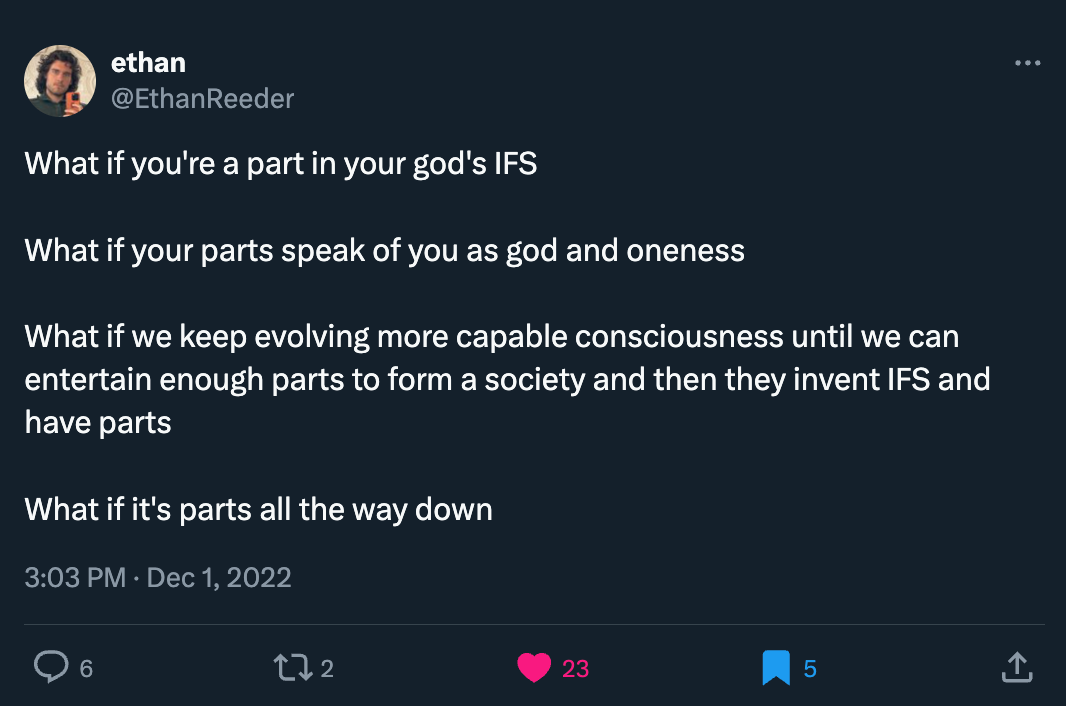It's parts all the way down
friendship egregore
There’s this story someone once told me about a hiker who got lost out in the Canadian wilderness for months.
For weeks and weeks, he saw no one. And the longer time went on, the more the voices in his head started coming out, started speaking out loud to each other.
It was interesting, he told reporters later, to notice them all take form.
He was able to identify the very distinct personalities and quirks that each one had. They expanded to fill the space of loneliness; for the first time in his life, he was long, lively conversations with himself.
Then the guy got rescued. And as he slowly integrated back into normal society, all of it went away.
—
This story always stuck with me.
With enough time and enough space, it seems our parts will step out from the folds of our unconscious and take very clear shape. It’s something that I am typically unaware of, unless I’m specifically doing parts work with a guide, or if one part is very very obvious (usually when I’m triggered).
But when we are around people, that multiplicity seems to recede into our unconscious,
Instead, we step into whichever part the egregore requires.
An egregore is a concept in Western esotericism that refers to a sort of formless, entity group-mind which arises from the collective thoughts and emotions of a distinct group of individuals.
It is very palpable. All you have to do is think of the last time you were at a concert, and how your body’s energy rose and fell with the energy of the crowd. Erik Hoel describes it beautifully:
This is constantly happening wherever we go, whether we are aware of our part-hood or not. We go to work, where we are a part of a groupmind. We go to a yoga class. Groupmind. We step into a bus. Temporary, subtle groupmind.
—
There’s one groupmind in particular that I’ve been becoming more and more interested in - the friendship group. And it’s been fascinating to notice how different people in different friend groups hold certain emotions, the way our internal parts, in the IFS sense, do.
I noticed it in particular after my friends and I had hung out several days in a row (booked an Airbnb together), and I saw just how many different parts came forth, and how the group ecology maintained balance through these parts.
For example, we would take turns carrying grumpiness, or aloofness, or I-need-my-space-ness. Grumpiness in particular was often a very needed role, because it brought to the surface something that needed to be discussed or changed. Everyone benefitted from one grumpy friend.
I used to judge people for being grumpy during group hangouts. It was cool to be able to recognize this and realize that, just as in IFS, every manifestation of every part is valuable and important, is wise beyond we know.






I was wondering just this week about how we bring forth our own emotions into the world, and specifically how there seemed to be dominant emotion(s) that govern (or support?) the bridges of friendship between two people. You know that friend you vent to or can always laugh with, regardless of circumstance? My mind wonders if the types of friends we have in life are reflective or analogous to the emotions we feel comfortable (or capable) of expressing. THANKS for writing!
Just yesterday I was noticing how my choice of words have changed since joining the corporate world. It's only been six months, but I can't get the word "alignment" out of my everyday vocab.
Curious to know: have you had the chance to read Convenience Store Woman? I've been thinking about how the MC adopts the language of her coworkers a lot these days.